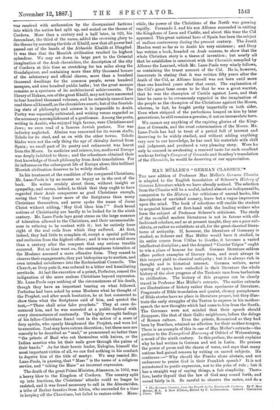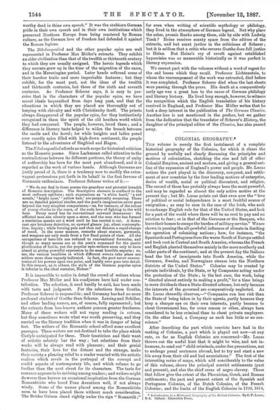MAX MOLLER'S "GERMAN CLASSICS."
THE new edition of Professor Max Miiller's German Classics is adapted to the English translation of Scherer's History of German Literature which we have already noticed. The selection from the Classics will be a -useful, indeed almost an indispensable, companion to the History; for criticisms of unread books, like descriptions of unvisited scenery, leave but a vague impression upon the mind. The book of selections will enable the student to acquaint himself at first-hand with the leading writers who form the subject of Professor Scherer's criticisms. The study of the so-called modern literatures is not in favour with old- fashioned scholars, and as at present taught, they are a poor sub- stitute, or rather no substitute at all, for the great classical litera- tures of antiquity. If, however, the literature of Germany is studied, as Scherer and Max Muller would have it studied, in its entire course from Dlfilas to Goethe, it becomes a varied intellectual discipline ; and the despised "Courier Tripes" ought to win a place of honour for itself. German literature seldom offers perfect examples of literary form, and must always in this respect yield to classical antiquity ; but it is always rich in thought and in historical interest. German writers, never sparing of space, have embodied in their literature the whole history of the slow progress of the Teutonic race from barbarism to civilisation. The history of this progress can be clearly traced in Professor Max Mfiller's extracts. The earlier extracts are illustrations of history rather than specimens of literature. Fragments of Bible translation and quaint, clumsy paraphrases of Bible stories have no place in literature proper, but they illus- trate the early struggles of the Teuton to express in his mother- speech the new thoughts which had come to him from the South. The Germans were not minded that their speech should disappear, like that of their Gallic neighbours, before the deluge of Roman culture. Even the priests, Romanised as they had been by Boniface, retained an affection for their mother-tongue. There is an example of this in one of Max Muller's extracts—the preface to the Evangelical Harmony of Otfried of Weissenburg, a monk of the ninth century. In this preface, the monk explains why he had written in German and not in Latin. He praises the power of prose and the charm of verse, and says that many nations had gained renown by writing on sacred subjects. He continues :—" Why should the Franks alone abstain, and not endeavour to praise God in their Frankish speech ? It is not accustomed to poetic expression, nor to the yoke of rule ; but it has a straight way of saying things, a fair simplicity. There- fore, bestir thyself that the law of God may sound forth, and sound fairly in it. Be careful to observe the metre, and do a • The German Claud., front the Fourth to tile Nineteenth Century. By F. Max Mailer, M.A. A New Edition, Edited by F. Lichtenstein. Oxford Clarendon Press. ISM.
worthy deed in thine own speech." It was the stubborn German pride in their own speech and in their own institutions which preserved Northern Europe from being mastered by Roman culture, as the German love of freedom had defended it against the Roman legions.
The Nibelungenlied and the other popular epics are well represented in Professor Max Muller's; extracts. They exhibit an older civilisation than that of the twelfth or thirteenth century to which they are usually assigned. The heroic legends which they narrate grew up in the time of the migration of the races, and in the Merovingian period. Later hands softened some of their harsher traits and snore improbable features ; but they exhibit, for the most part, not the ideas of the twelfth and thirteenth centuries, but those of the sixth and seventh centuries. As Professor Scherer says, it is easy to per- ceive that in the characters of the popular epics, we have moral ideals bequeathed from days long past, and that the situations in which they are placed are thoroughly out of keeping with chivalry and with Christianity itself. The priests always disapproved of the popular epics, for they instinctively recognised in them the spirit of the old heathen world which they bad conquered. The people, however, loved them ; and a difference in literary taste helped to widen the breach between the castle and the hovel; for while knights and ladies pored over courtly epics filled with high-flown sentiment, the people listened to the adventures of Siegfried and Hagen.
TheNibelungenlied affords as much scope for historical criticism as the Homeric poems. Since Lachmann called attention to the contradictions between its different portions, the theory of unity of authorship has been for the most part abandoned, and it is regarded as the work of various hands. Although Germans are justly proud of it, there is a tendency now to modify the extra. vagant pretensions put forth in its behalf in the first fervour of Germanic enthusiasm. Professor Scherer writes of it :— " We do not find in these poems the grandeur and pictorial breadth of Homeric description. The descriptive element is confined to the most ordinary epithets; such expressions as a white hand,' 'a red month," bright eyes," yellow hair,' are perpetually recurring. There are no detailed poetical similes, and the poet's imagination never goes beyond the very simplest comparisons,—as, for instance, of the colour of young cheeks to the roses, of the rode love of fighting to the wild boar. Every mood has its conventional outward demeanour: the afflicted man sits silently upon a stone, and the man who has formed a resolution speaks not a word until be has carried it out. A down- cast eye betokens dejection, an upward glance joy, silent contempla- ties, inquiry ; while turning pale and then red denotes a rapid change of mood. In the same manner, remarks about stature, garments, and weapons are only made from a few fixed points of view. All the occupations of hero-life are reduced to conventional formulas, and though so many means are at the poet's command for the poetic glorification of battle, yet the popular epic-writers seem only to have aimed at giving powerful expression to its most horrible aspects ; so, too, the various localities in which different events take place are seldom more than vaguely indicated. In fact, the poet never concen- trates all his powers upon one point, and hardly ever goes into detail. In this respect, as in others the style of the German popular epics is inferior to the ideal narrator, Homer."
It is impossible to notice in detail the crowd of writers whom Professor Max Muller and his coadjutors have laid under con- tribution. The selection, it need hardly be said, has been made with taste and judgment. For the selections from Goethe, Professor Scherer is responsible ; and Germany has had no more profound student of Goethe than Scherer. Lessing and Schiller, and other leading names, are, of course, fully represented, bat the extracts from less-known anthers possess greater freshness. Many of these writers will not repay reading in extenso, but they sometimes wrote what was worth preserving, and they carried on the literary tradition when it was in danger of being lost. The writers of the Romantic school afford some excellent passages. These writers are not destined to take the place which Carlyle anticipated for them. Their fanaticism and their want of artistic sobriety bar the way ; but selections from their works will be always read with pleasure ; and their genial fantasies, their love for the distant and the strange, make their society a pleasing relief to a reader wearied with the artistic realism which revels in the portrayal of the corrupt and sordid aspects of contemporary life, and which refuses to go farther than the next street for its characters. The taste for romance appears to be reviving among readers; and writers might do worse than borrow an occasional inspiration from the German Romanticists who loved Fran Aventinre well, if not always wisely. Some of the names placed among the Romanticists seem to have been placed there without much consideration. The Briider Grimm stand rightly under the sign " Romantik for even when writing of scientific mythology or philology, they lived in the atmosphere of German legend. Bat why place the sober, prosaic Hanka among them, side by side with Ludwig Tieck P HeMe receives scanty space from the editors of the extracts, and but scant justice in the criticisms of Scherer ; but it is seldom that a critic who reveres Goethe does full justice to Heine. But Heine's cry of revolt against established hypocrisies was as memorable historically as it was perfect in literary expression.
We cannot part with the volumes without a word of regret for the sad losses which they recall. Professor Lichtenstein, to whom the rearrangement of the work was entrusted, died before it was completed. Professor Scherer died when the last sheets were passing through the press. His death at a comparatively early age was a great loss to the cause of German philology and literary history. He lived long enough, however, to witness the recognition which the English translation of his history received in England, and Professor Max Muller writes that he took a deep interest in the publication of The German Classics. Another loss is not mentioned in the preface, but we gather from the dedication that the translator of Scherer's History, the daughter of the principal editor of the Classics, has also passed away.

































 Previous page
Previous page